Everywhere you turn these days, someone’s talking about AI co-pilots and chatbots. Lawyers know the buzz, too – and many wouldn’t mind having a digital partner to handle the routine work for them.
So as we move into 2026, a provocative question looms: will AI become the new paralegal?
The answer isn’t a simple yes or no. In this article, we explore how legal teams are already using AI to automate routine work, enhance decision-making, and unlock time for strategic thinking – all while keeping human expertise at the core.
What is AI in legal?
AI in the legal industry refers to software systems capable of performing tasks that typically require human intelligence, such as reading, analyzing, drafting, or predicting legal information.
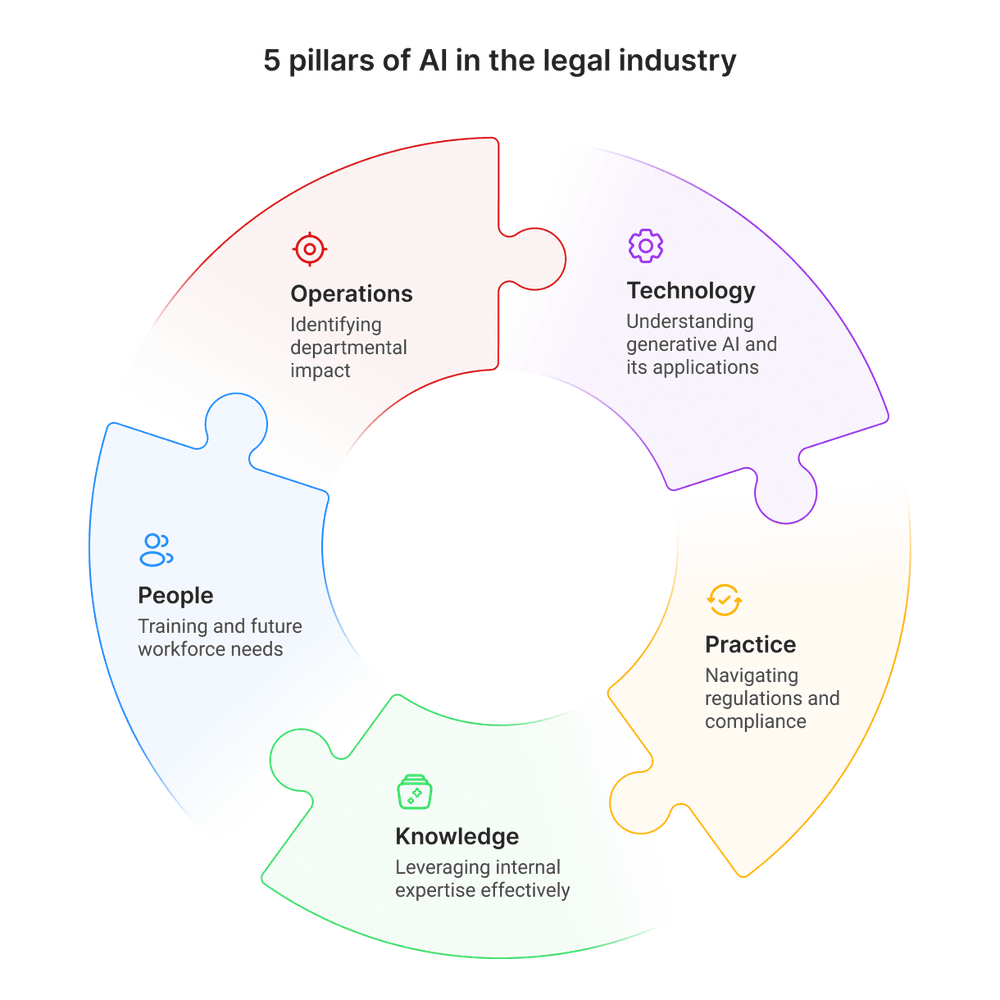
These systems rely on machine learning (ML) and natural language processing (NLP) to understand vast amounts of unstructured text: statutes, case law, contracts, or filings. Legal-specific AI tools are fine-tuned to handle the complex structure of legal language.
Here is a schematic example of how such systems operate:
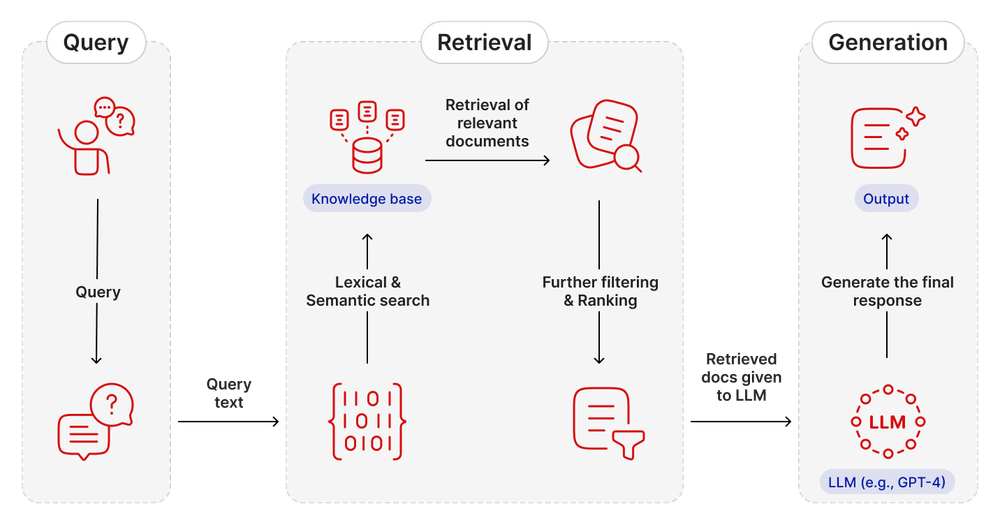
Legal technology is widely effective, with most CLOs reporting that key systems meet their needs, including legal hold and IP management, contract lifecycle management, and risk/cybersecurity tools.
Over half (52%) of legal teams are already using AI to support functions like matter management, document review, and data analysis, showing its growing role in making legal work smarter and more efficient.
Can AI be used in legal field?
Yes, and it’s widely applied. According to the American Bar Association (ABA) 2024 Tech Report, nearly 30% of U.S. attorneys reported using AI in some form.
On average, leading AI-based research tools adopted or considered by law firms include:
- ChatGPT – 52.1% of firms, the clear leader across firms of all sizes
- Thomson Reuters CoCounsel – 26.0%, popular among mid-to-large firms
- Lexis+ AI – 24.3%, adoption varies by firm size
ChatGPT dominates the market, while the remaining share shifts depending on firm size and specific use cases. Some models stand out for their eloquence, while others excel at thoroughly analyzing the given problem.
The 5 AI in legal cases that law firms encounter most often:
- Document creation: AI-powered software can automatically generate legal documents, including contracts, pleadings, and privacy policies. By inputting specific data, personalized documents can be generated that meet legal requirements and save time.
- Document analysis: AI systems can analyze large volumes of legal documents to extract relevant information, identify trends, and conduct risk assessments. This capability is particularly useful in due diligence and contract review.
- User-friendly presentation of legal content: AI-based chatbots can provide users with legal information in easily understandable language. They are available around the clock and can offer advice on basic legal questions, thus democratizing access to legal counsel.
- Support with legal research: AI can support lawyers in their research by quickly finding relevant legal texts and precedents. This reduces the time required to search for information and enables a deeper, broader analysis of the legal situation.
In large firms, AI is rapidly becoming a core part of the legal tech stack. A reliable technology partner can implement AI solutions from the ground up. These solutions can automate first drafts, summarize lengthy documents, and flag inconsistencies – all while ensuring full compliance with regulatory frameworks such as ABA ethics rules, GDPR, and local data protection laws.
Bring AI to your legal workflows today
See how much time and cost you can save with AI-powered legal automation.
How to use AI in legal practice
Law firms and in-house teams can harness AI effectively by adopting a “human-in-the-loop” approach. That means integrating AI where it adds measurable value while maintaining expert supervision.
Here’s a simple AI-readiness checklist for legal professionals:
- Identify repetitive, data-heavy tasks (e.g., discovery review, contract comparisons).
- Select domain-trained AI tools with transparent sourcing and model explainability.
- Train your team to verify AI outputs, not just accept them.
- Ensure data security and client confidentiality – never upload sensitive client materials into public models.
- Follow ABA’s Formal Opinion 512 (2024), which emphasizes lawyer competency, supervision, and client disclosure when using generative AI.
According to the 2025 State of Contracting Survey by LegalOn Technologies and In-House Connect, legal teams see clear benefits from AI in contract review.
The top advantages include significant time savings (79%), faster turnaround times (69%), and a reduction in tedious, routine work (69%), freeing associates and paralegals to focus on higher-value, analytical tasks.
So, how can you use AI for legal documents? You can draft, review, and manage legal documents, particularly for:
- Non-disclosure agreements (NDAs)
- Employment contracts
- Vendor and supplier agreements
- Client engagement letters
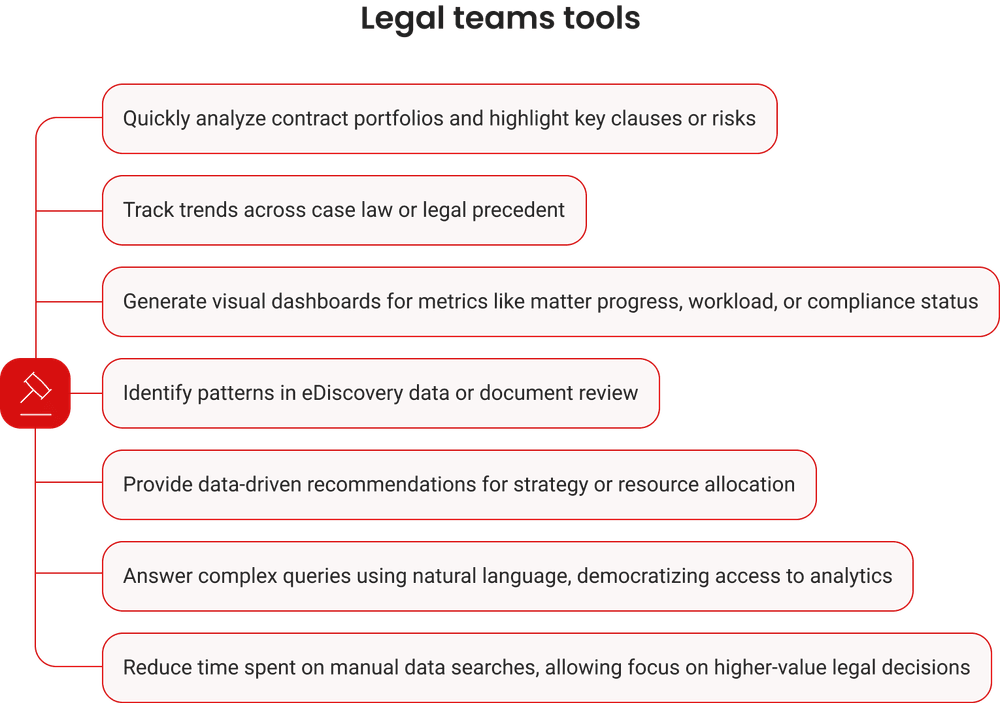
However, every AI-generated document should undergo human review before submission. The ABA and most bar associations stress that delegation to AI does not relieve lawyers of responsibility for the accuracy and ethical integrity of the final document.
Start your AI journey the smart way.
Assess your team’s readiness with our AI Readiness Checklist and avoid common pitfalls.
AI in legal: Cases shaping the future of practice
Even though most lawyers are familiar with AI, many still find themselves staring at their screens, unsure how to use it effectively in daily work. The motivation is there – but the first step often isn’t.
A good place to start is by deciding what role you want AI to play in supporting you. Think of it as a creative sparring partner, a diligent colleague, or a dedicated learning companion.
1. Support in daily legal work – with a clear division of tasks.
AI can act as a diligent colleague, one that doesn’t tire of reading, comparing, or summarizing. While it can’t replace legal professionals, it can handle many repetitive or time-consuming tasks that make up a large part of daily work.
Think of a mid-sized logistics company that recently introduced an AI co-pilot for its in-house legal team. The lawyers were struggling with the same problems many legal departments face: reviewing dozens of nearly identical NDAs, summarizing long service agreements, and answering vendor questionnaires that all asked the same questions in slightly different ways.
By integrating the co-pilot into their contract management system, they were able to offload the most repetitive work to AI, while keeping lawyers firmly in control.
The AI now scans contracts, flags risky clauses, builds compliance checklists, and even fills in due diligence forms using existing data. Each result is still reviewed by a human, but what once took hours can now be done in minutes.
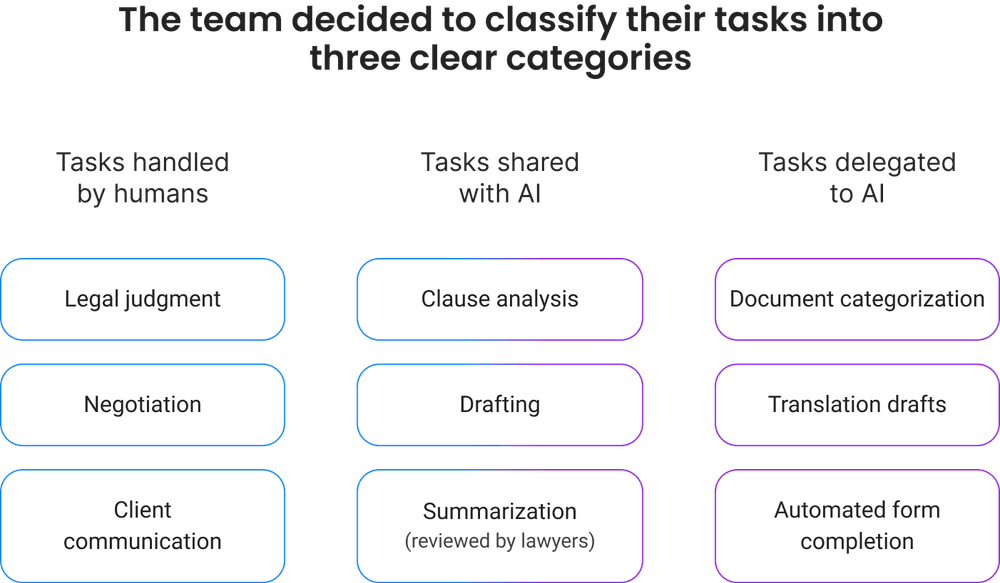
The results were striking: contract turnaround time dropped by half, and risk detection accuracy reached 90%. Most importantly, lawyers were able to redirect their attention from mechanical reviews to strategic advisory work.
As this example shows, AI can free lawyers up from the mechanical parts so they can focus on what truly requires expertise and judgment.
2. Support for continuous learning – from studies to practice
AI can also act as a dedicated learning companion, helping legal professionals and students continuously build and refresh their knowledge. Learning never stops in law – and AI makes it faster, more interactive, and more accessible.
Here’s what AI can already do:
- Simplify complex concepts and explain legal principles in plain language.
- Generate summaries of new legislation, judgments, or legal articles.
- Customize exercises and quizzes based on individual progress.
- Provide feedback on written arguments or case analyses.
Similar solutions are already transforming corporate learning. For example, Aristek developed an AI-driven training and assessment system for a US-based manufacturer, reducing employee training time by 30% and cutting instructional workload by 67%.
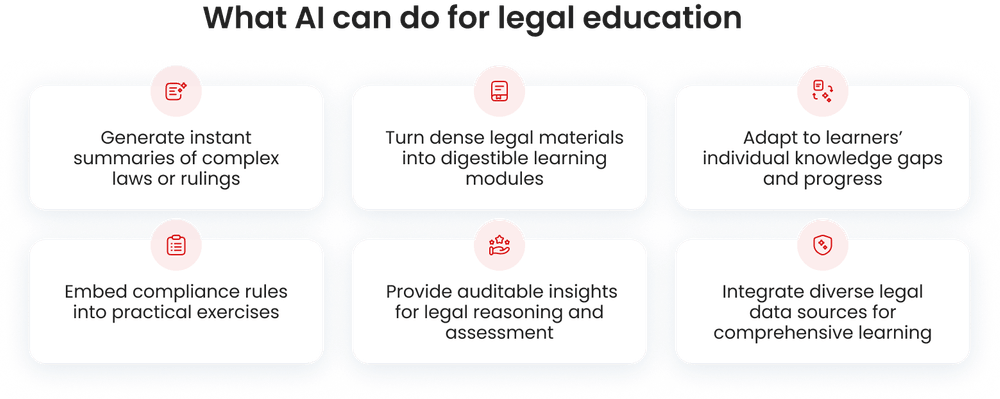
With AI, continuous learning becomes less about catching up and more about staying ahead – efficiently and intelligently. As we know from Ebbinghaus’s curve, without repetition, we can forget up to 75% of information within a month.
3. Support in decision-making – smart insights
AI can act as a smart assistant, providing insights and recommendations without replacing human judgment. Just as Aristek built an AI assistant for analytical dashboards that helped a logistics company turn complex data into clear, actionable insights.
This approach shifts AI from a passive repository of information to an active partner in decision-making, speeding up insights while keeping final judgment in human hands.
What are the AI limitations in legal?
Even the most advanced AI tools have limitations. A 2024 study by Stanford’s Human-Centered Artificial Intelligence (HAI) tested AI performance using over 200 carefully designed legal queries. What was done:
- General research questions on doctrine, case holdings, and bar exam topics
- Jurisdiction- or time-specific questions, including circuit splits and recent legal changes
- False premise and factual recall questions to reflect common misunderstandings and objective facts
The study provides insight into how AI performs across a variety of legal research scenarios.
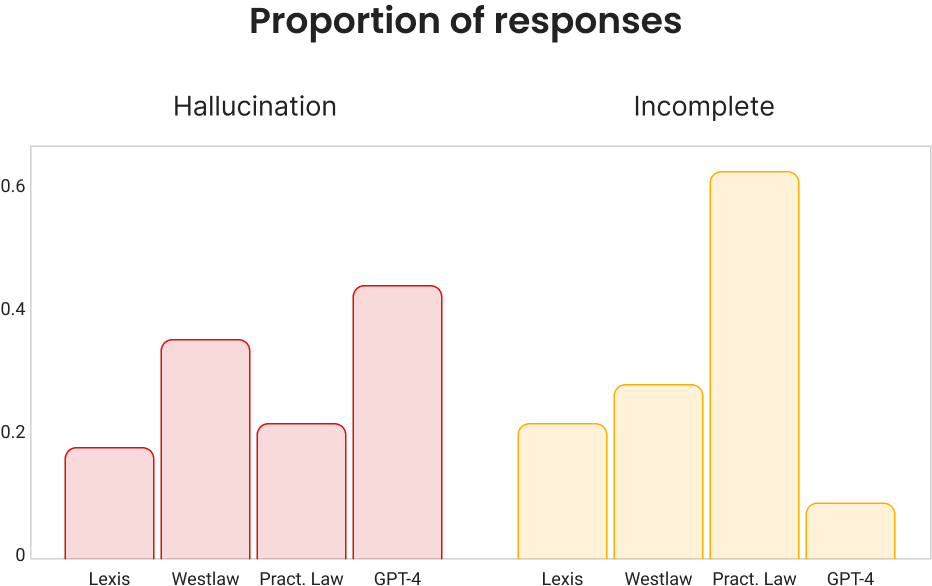
What the study found is fascinating. AI can stumble in two ways: sometimes it simply gets the law wrong, and other times it’s more subtle, giving the right answer but pointing to sources that don’t actually back it up.
Ultimately, the researchers came up with three key takeaways:
- Bespoke legal AI tools improve accuracy but still hallucinate frequently.
Lexis+ AI and Ask Practical Law AI produced incorrect information over 17% of the time, while Westlaw AI-Assisted Research hallucinated more than 34% of the time. - Hallucinations can be subtle and misleading.
AI responses may appear correct but cite sources that do not actually support the claims, making misgrounded citations particularly risky in legal research. - Real-world queries remain challenging.
Even with specialized datasets of over 200 open-ended legal questions covering doctrine, jurisdiction, false premises, and factual recall, AI systems struggle to provide consistently accurate and complete answers.
How will AI impact the legal industry?
The legal sector is undergoing its most significant technological shift since the digitization of case law. Nearly half (44%) of general counsel across 12 countries now use AI, up from 28% last year and 20% in 2023, according to FTI Consulting and Relativity’s General Counsel Report 2025.
AI adoption has doubled in just two years, with legal leaders reporting positive experiences in 9 out of 10 use cases. However, 85% still worry about potential legal risks. Let’s take a look at three main areas of upcoming AI impact across legal teams.
1. Redefining roles and workflows
AI won’t eliminate paralegals – it will redefine their responsibilities. Instead of sifting through thousands of pages of discovery, paralegals will oversee AI-assisted tools, ensuring accuracy and context.
2. Shifting billing models
With automation handling routine work faster, firms may shift from billable hours to value-based pricing. Clients will expect efficiency, not time spent.
3. Ethical and regulatory guardrails
The FTC’s 2025 enforcement against DoNotPay, the self-proclaimed “AI lawyer,” highlights regulators’ growing scrutiny of AI in consumer-facing legal services. Firms must be transparent about their use of AI and avoid overstating capabilities.
In a nutshell
AI will not replace paralegals – but paralegals who use AI will replace those who don’t.
The most forward-looking firms are already training hybrid teams where human judgment meets AI efficiency. These teams use technology to accelerate output without compromising quality, accuracy, or trust.
As ABA Formal Opinion 512 reminds us, “Lawyers using AI must remain competent, supervise its use, and ensure client confidentiality.”
That’s the real future of the legal profession: not automation, but collaboration. That’s exactly what the Aristek team can help you achieve – use AI in a legally compliant manner.






